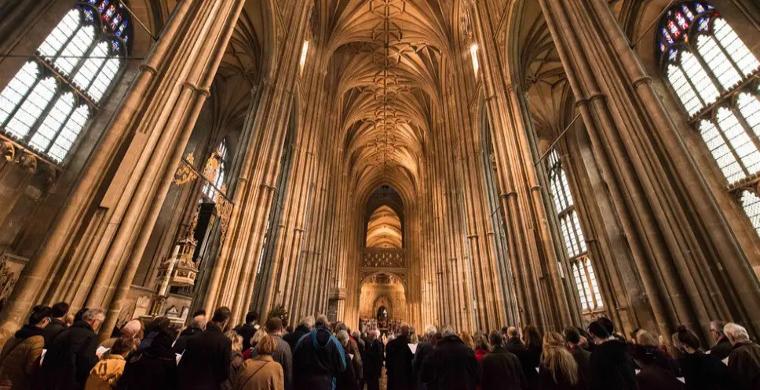Church of England staring at oblivion as just 2% of young Britons say they identify with it
UK's national religion facing 'unrelenting decline', research finds
By Chris Baynes
THE INDEPENDENT
https://www.independent.co.uk/
September 7, 2018
The number of people who identify as belonging to the Church of England has dropped to a record low in an "unrelenting decline" that could threaten the denomination's future, research suggests.
CofE affiliation has fallen to just 2 per cent among adults aged 18 to 24, while the majority of every age group now has no religion, the British Social Attitudes (BSA) survey found.
The number of Britons who describe themselves as part of the church has more than halved since 2002, from 31 per cent to 14 per cent. The number who actually attend sermons is far lower.
The sharpest drop was among 45- to 54-year-olds, only 11 per cent of whom identify with the CofE compared to 35 per cent in 2002.
The strongest affiliation with the church was among over-60s, but even there a minority of 30 per cent say they belong to the denomination.
It is the decline in young members which is particularly ominous for the CofE, however, because evidence suggests people rarely turn to organised religion later in life.
More than four times as many 18- to 24-year-olds -- 9 per cent -- said they belonged to the church 16 years ago.
The drop comes amid a trend towards a secular society. Fifty-two per cent of people now say they belong to no religion, up from 41 per cent in 2002.
In Scotland an even higher proportion -- 56 per cent -- say they have no religion, and only 18 per cent belong to the Church of Scotland, according to the BSA.
Roger Harding, head of public attitudes at the National Centre for Social Research, which conducts the survey, said: "Our figures show an unrelenting decline in Church of England and Church of Scotland numbers.
"This is especially true for young people where less than one in 20 now belong to their established church.
"While the figures are starkest among younger people, in every age group the biggest single group are those identifying with no religion."
The survey, answered last year by a representative sample of 3,988 people, also found a significant gap between religious affiliation and church attendance. Only 21 per cent of people who described themselves as belonging to the CofE said they went to church.
That compares to 41 per cent of Roman Catholics, whose numbers have remained relatively stable since 2002.
Dave Male, the CofE's director of evangelism and discipleship, said: "It has been clear for some time that we have moved from an era of people automatically, and perhaps unthinkingly, classifying themselves as Church of England or Anglican to one in which identifying with a faith is an active choice.
"We also know from research that people, particularly younger people, are less aware of denominations.
"Yet research, especially amongst young people, shows an increase in willingness to engage in faith. Our experience is that people -- of all ages -- haven't stopped searching for meaning and answers in their life.
"Ultimately the church exists to share the good news of Jesus Christ. That was never meant to be easy and that work goes on whatever the figures may say."
Stephen Evans, chief executive of the National Secular Society, said the research "calls into question the UK's constitutional settlement which remains mired in religious privilege -- embarrassingly out of step with the nation's secular outlook".
He added: "Politicians should rethink religion's public role and the Church of England's relationship with the state. In particular they should call time on the seats given as of right to 26 Anglican clergy in the legislature, and roll back religious groups' considerable influence over publicly funded schools."
Richy Thompson, director of public affairs at Humanists UK, suggested it was "simply untenable that the church continues to run a third of all our state schools" when only a tiny minority of young people identified with it.
"These figures must surely act as an urgent wakeup call for the need to have a renewed conversation about the place of religion or belief in British public life, so that a new settlement can be forged that is more equitable for all and is better able to serve future generations," he added.














